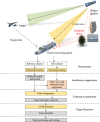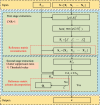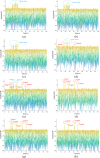Nonuniform Doppler extraction-enhanced multichannel extensive cancellation algorithm for passive radar using Iridium satellite signals
- PMID: 40804086
- PMCID: PMC12350831
- DOI: 10.1038/s41598-025-14149-y
Nonuniform Doppler extraction-enhanced multichannel extensive cancellation algorithm for passive radar using Iridium satellite signals
Abstract
Passive radar (PR) relies on receiving signals reflected from targets by other existing noncooperative radiation sources, which are broadly divided into ground- and space-based categories, to achieve target detection and tracking. In the context of space-based PR, this paper proposes a PR using the Iridium satellite signal, which is a low-orbit satellite communication signal with global coverage. With an improved detection range and accredited ambiguity function, a PR using the Iridium satellite signal can address the issues of limited terrestrial coverage for ground-based PR and insufficient receiving power for medium- to high-orbit space-based PR. In addition, to address the problem of multipath clutter broadening caused by the dual movement of low-orbit satellites and the PR receiver, this paper proposes a nonuniform Doppler extraction-enhanced multichannel extensive cancellation algorithm (NuDE-mECA) to suppress multipath clutter broadening while preserving near-field low-speed target detection capabilities. Compared with the traditional multichannel ECA and uniform Doppler extraction multichannel ECA, the NuDE-mECA achieves significantly reduced computational complexity while improving clutter suppression performance and maintaining detection capabilities for low-speed targets. These results provide valuable insights for the lightweight and high-precision design of space-based PR systems.
Keywords: Detection power analysis; Iridium satellite signal; Multichannel extensive cancellation algorithm; Passive radar.
© 2025. The Author(s).
Conflict of interest statement
Declarations. Competing interests: The authors declare no competing interests.
Figures






















References
-
- Kuschel, H. Approaching 80 years of passive radar. 2013 International Conference on Radar - Beyond Orthodoxy: New Paradigms in Radar, RADAR 2013, Adelaide, SA, Australia. 10.1109/RADAR.2013.6651987. (2013).
-
- Song, J., He, Y., Cai, F. & Tang, X. Overview of passive radar technology based on non-cooperative radar illuminator. Syst. Eng. Electron.10.3321/j.issn:1001-506X.2009.09.028 (2009).
-
- Zheng, H., Wang, J., Jiang, S., Wu, X. & Gu, X. Passive bistatic radar 1–10 (National Defense Industry Press, 2017).
-
- Wan, X. et al. Research progress and development trend of the multi-illuminator-based passive radar. J. Radars9(6), 939–958. 10.12000/JR20143 (2020).
-
- Veremyev, V., Vorobev, E. & Kokorina, Y. Feasibility study of air target detection by passive radar using satellite-based transmitters. 2019 IEEE Conference of Russian Young Researchers in Electrical and Electronic Engineering (EIConRus), 154–157. 10.1109/eiconrus.2019.8656630. (St Petersburg Electrotechn Univ, 2019).
Grants and funding
LinkOut - more resources
Full Text Sources
Research Materials

